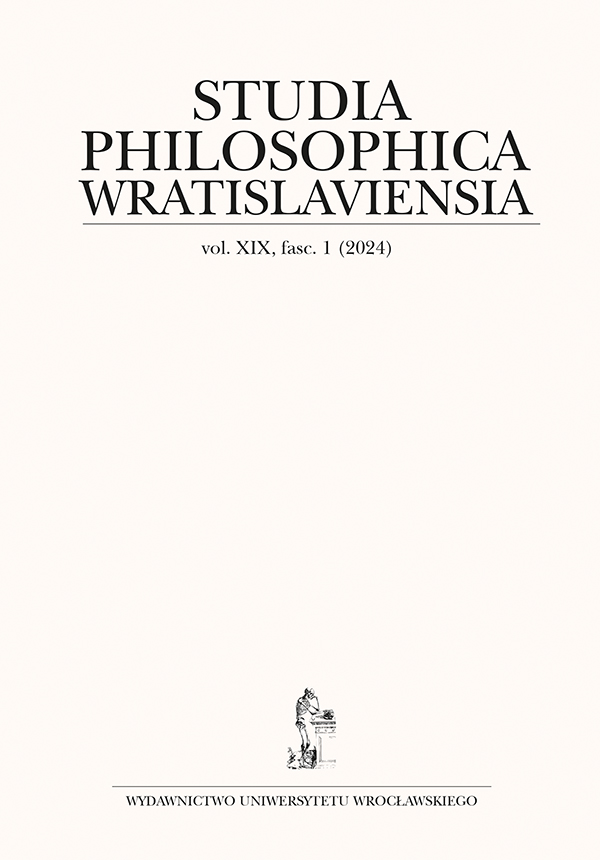

Articles

The paper is an introduction to the collection of articles, published in the current issue of “Studia Philosophica Wratislaviensia”, on both the subject matter conceived (as broadly as possible) as Islamic metaphysics and on the very studies of this research area (the current state of knowledge, conjunctures, tendencies, prospects etc.). It attempts to provide presentation of discussion of topics and problems, which can be included in this area, but offers also first drafts of tentative and “work-in-progress definitions” of how Islamic metaphysics can be understood with its orientation on the most recent contexts, inspirations and applications, internal structures and dynamics relating to its interpretations and evolutions, as well as its original, historical versions. One of the inspirations for the project of studying the Islamic metaphysics presented here is rooted in Jasser Auda’s ambitious works on Islamic law, not narrowed to a technical, specialized domain of research about foundations (fundamentals), sources, jurisprudence (usul al-fiqh) or specific legislation related to the Shari’a. The paper sketches a general orientation map introducing basic concepts and methodological strategies used by Auda with the prospects of their further application to the study (and potential rethinking) of Islamic metaphysics.
AbuSulayman A.A., Światopogląd koraniczny. Przyczynek do dyskusji o odnowie kultury, tłum. M. Starnawski, M. Turowski, M. Czyż (red.), Sarajevo 2022.
Ahmed A.S., Postmodernism and Islam: Predicament and Promise, London 1992.
Auda J., The Concept of Civil State in the Framework of Islamic Juridical Tradition: Introductory Remarks, „International Research Journal of Islamic Civilization” 1 (2021), s. 46–67.
Auda J., A Critique of the Theory of Abrogation, tłum. A. Salahi (ed.), Leicestershire 2019.
Auda J., Journal of Contemporary Maqasid Studies: Methodological Aspirations, „Journal of Contemporary Maqasid Studies” (2022), s. i–iv.
Auda J., Maqasid al-Shariah as Philosophy of Islamic Law: A Systems Approach, London-Washington 2007.
Auda J., Maqasid Methodology for Re-Envisioning Islamic Higher Education, „Journal of Contemporary Maqasid Studies” 1 (2022), s. 31–58.
Auda J., Realizing Maqasid in the Sharia’ah, [w:] The Objectives of Islamic Law: The Promises and Challenges of the Maqasid al-Shari’a, I. Nassery, R. Ahmed, M. Tatari (eds.), Lanham 2018, s. 35–56.
Auda J., Re-envisioning Islamic Scholarship: Maqasid Methodology as a New Approach, Swansea 2021.
Auda J., Kamel M., A Modular Neural Network for Vague Classification, [w:] Rough Sets and Current Trends in Computing, W. Ziarko, Y. Yao (eds.), Berlin-Heidelberg 2001, s. 584–589.
Bhojani A.-R., Towards the Hermeneutics of a Justice-Oriented Reading of Shari’a, [w:] Visions of Shari’a: Contemporary Discussions in Shi’i Legal Theory, A.-R. Bhojani, L. de Rooij, M. Bohlander (eds.), Leiden-Boston 2020, s. 149–173.
Duderija A., Contemporary Muslim Reformist Thought and Maqasid cum Maslaha Approaches to Islamic Law: An Introduction, [w:] Maqasid al-Shari’a and Contemporary Reformist Muslim Thought, A. Duderija (ed.), Basingstoke (Houndmills) 2014, s. 1–11.
Duderija A, The Imperatives of Progressive Islam, London 2017.
Duderija A., Qur’an, Sunnah, Maqasid, and the Religious Other: The Ideas of Muḥammad Shahrur, [w:] The Objectives of Islamic Law: The Promises and Challenges of the Maqasid al-Shari’a, I. Nassery, R. Ahmed, M. Tatari (eds.), Lanham 2018, s. 89–109.
El-Bizri N., Falsafa: A Labyrinth of Theory and Method, „Synthesis Philosophica” 62 (2016), s. 295–311.
Emon A., Epilogue, [w:] The Objectives of Islamic Law: The Promises and Challenges of the Maqasid al-Shari’a, I. Nassery, R. Ahmed, M. Tatari (eds.), Lanham 2018, s. 285–296.
Feenberg A., Technosystem: The Social Life of Reason, Cambridge 2017.
Harvey R., Tutt D., Mapping Justice in Islamic Thought: From the Premodern to the Postmodern, [w:] Justice in Islam: New Ethical Perspectives, R. Harvey, D. Tutt (eds.), Herndon 2023, s. 1–25.
Hofkirchner W., Social Relations: Building on Ludwig von Bertalanffy, „Systems Research and Behavioral Sciences” 36 (2019), s. 263–273.
Johnston D., Maqasid al-Shari’a: Epistemology and Hermeneutics of Muslim Theologies of Human Rights, „Die Welt des Islams” 47 (2007), s. 149–187.
Johnston D.D., A Turn in the Epistemology and Hermeneutics of Twentieth Century Usul al-Fiqh, „Islamic Law and Society” 11 (2004), s. 232–282.
Kersten C., Contemporary Thought in the Muslim World: Trends, Themes, and Issues, London 2019.
Kouw M., Heuvel C. van den, Scharnhorst A., Exploring Uncertainty in Knowledge Representations: Classifications, Simulations, and Models of the World, [w:] Virtual Knowledge: Experimenting in the Humanities and the Social Sciences, P. Wouters, A. Beaulieu, A. Scharnhorst, S. Wyatt (eds.), Cambridge 2013, s. 89–125.
Mattson I., Qur’an. Historia i rola Świętej Księgi w życiu muzułmanów, tłum. K. Makaruk, M. Turowski, Wrocław 2014.
Monein A.A., The Ontology and Epistemology of Maqasidi-based Knowledge and Its Educational Implications: A Methodological Perspective, „Journal of Contemporary Maqasid Studies” 1 (2022), s. 59–78.
Moosa E., Considering Being and Knowing in an Age of Techno-Science, [w:] Medicine and Shariah: A Dialogue in Islamic Bioethics, A.I. Padela (ed.), Notre Dame 2021, s. 87–119.
Moosa E., Technology in Muslim Moral Philosophy, „Journal of Religion and Health” 55 (2016), s. 369–383.
Najimudeen M.R., Jasser Auda, Re-Envisioning Islamic Scholarship: Maqasid Methodology as a New Approach (rec.), „Islam and Civilisational Renewal” 13 (2002), s. 168–171.
Polak T., System kościelny, czyli przewagi pana K., Poznań 2020.
Rahman F., Islam and Modernity: Transformation of an Intellectual Tradition, Chicago 1984.
Rassool G.H., Integrated Research Methodologies in Islamic Psychology, London-New York 2024.
Simon Z.B., The Epochal Event: Transformations in the Entangled Human, Technological, and Natural Worlds, Cham 2020.
Turowski M., Islamization, modernization, and civilizational analysis: Non-essentialist comparative perspectives, „Postcolonial Text” 17 (2022), s. 1–25.
Warren D., Doha—The Center of Reformist Islam? Considering Radical Reform in the Qatar Context: Tariq Ramadan and the Research Center for Islamic Legislation and Ethics (CILE), [w:] Maqasid al-Shari’a and Contemporary Reformist Muslim Thought, A. Duderija (ed.), Basingstoke (Houndmills) 2014, s. 76–99.